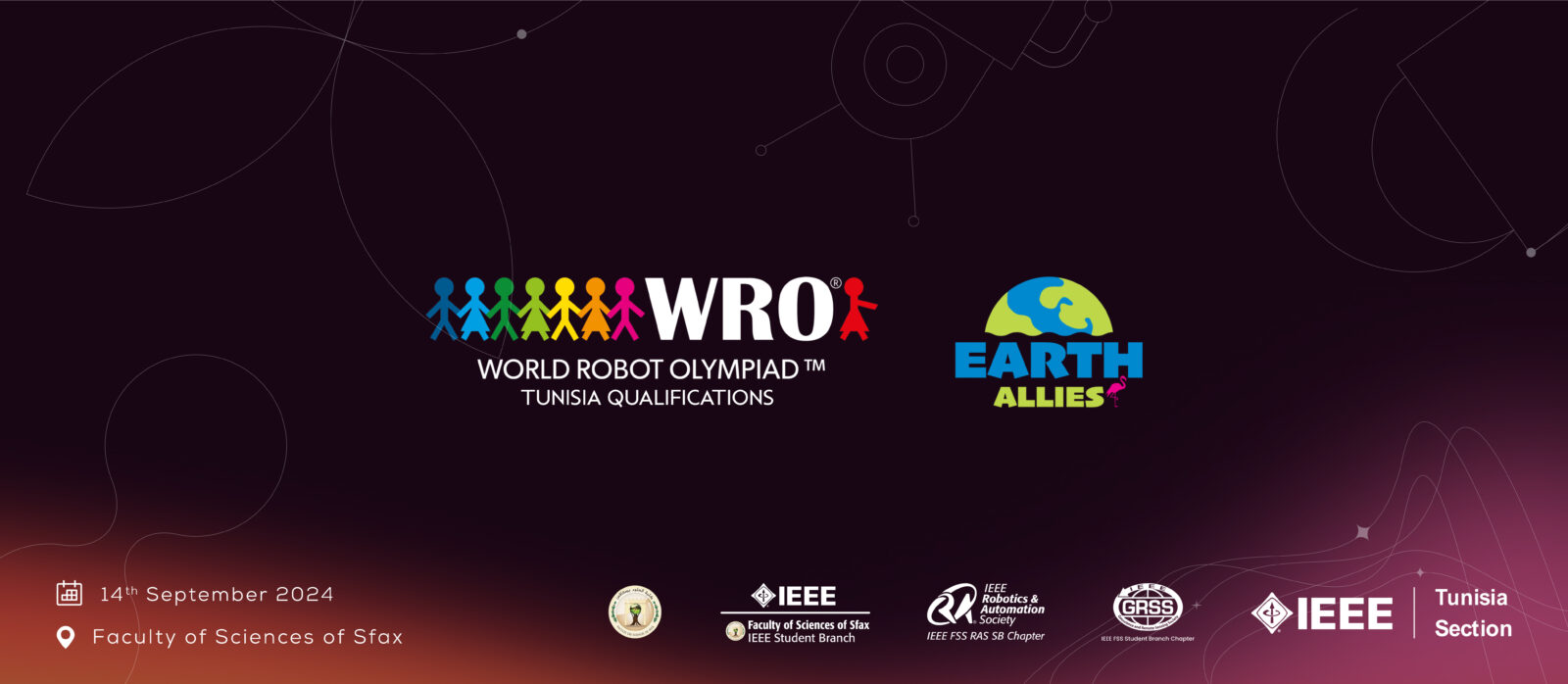Welcome!

Robotics is a wonderful platform for learning 21st-century skills. Solving robotic challenges encourages innovation and develops creativity and problem-solving skills in students. Since robotics spans multiple curricular subjects, students must learn and apply their knowledge of science, technology, engineering, math, and computer programming.
The most rewarding part of designing robots is that students have fun. They work together as a team, discovering their solutions. Coaches guide them along the way, then step back to allow them their victories and losses. Students thrive in this supportive and immersive environment, and learning occurs as naturally as breathing air.
At the end of the day, after a fair competition, students can say they did their best, learned, and had fun.
WRO-Tunisia’2024 will take place on 14th September 2024 at the faculty of sciences of Sfax (FSS). To participate in the WRO 2024 Tunisian qualifications, teams should register by 31St August 2024 at 23:59 Tunis time.
Registration Link: <Registration Link>
The judges will select the best team that respects and fulfills the WRO material requirements to qualify for the finals of the 20th World Robot Olympiad (WRO), which will be organized in Izmir , Turkey on 28-30 November 2024. Each participant of a qualified team for the WRO finals in Panama should plan to pay the registration fees for WRO 2024 and cover their travel expenses to Turkey. Qualified teams are encouraged to look for sponsors in advance.
WRO 2024 – Welcome to WRO International Final 2024 in Turkey
Theme: EARTH ALLIES
The WRO® theme for 2024 is Earth Allies.
In 2024 teams will learn more about how we humans affect nature and how nature and natural events can affect us. They will investigate how robots can help us live in harmony with nature. Can robots help us live in places where nature is dangerous or harsh, and can they assist us in living a more environmentally friendly lifestyle?

WRO® Guidelines
The regulations for each category are described in the General Rules for that category.
Additional regulations are:
A team may participate in only one category per season. Any student may participate in one team only.
The age group defines the maximum age of the student in the calendar year of the competition. (Not their age at the date of a competition.)
The minimum age of a coach at an international WRO® event is age 18.
Coaches may work with more than one team.
Rules
Participants should follow the General Rules of the track according to the team members age.
Competition platforms looks like presented below but NOT exactly equal.
Participants should adjust (before the competition) their robots using the proposed platform.
Follow Us On Facebook
WRO Ethics Code

The teams should take part with the Ethics Code in mind and they do not use copies / internet solutions. The teams need to be able to explain their robot solutions and their programs.
If the Jury identify a robot that is clearly not the work of the team (for example full copy from internet, or clearly built by the coach), the team will be disqualified.
Teams should sign the ethics code letter <link> and present the signed hard copy in the qualification day.
LEGO Education representative in Tunisia
Contact Promoculture to buy your LEGO kit with special discount for WRO participants!
Categories
- At WRO® we offer challenging competitions for students in the age range from 8 up to 19. We have four competition categories, each with their own characteristics.
- RoboMission (2-3 people guided by Coach)
-
-
- Elementary (8-12 years)
- Junior (11-15 years)
- Senior (14-19 years)
-
- RoboSports (2-3 people guided by Coach)
- 11-19 Years
- FutureInnovators (2-3 people guided by Coach)
-
-
- Elementary (8-12 years)
- Junior (11-15 years)
- Senior (14-19 years)
-
- Future Engineers (2-3 people guided by Coach)
- 14-19
Age = year of the competition – birth year.
Example: If you turn 16 in December (after the international final) you have to register in the
Senior age group.Note: Students younger than the age group definition may only participate if at least one other team member has the correct age.
ROBOMISSION
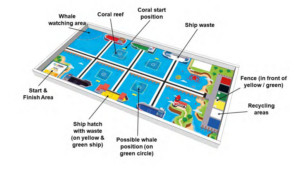
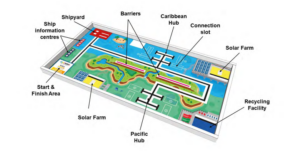
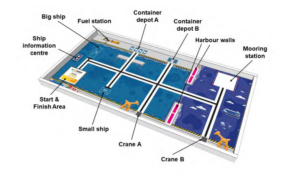
In the WRO RoboMission category teams design robots that solve challenges on a competition field. The robots are fully autonomous. For each age group a new field and mission are developed each year. On the day of the competition a surprise rule adds a new element to the mission. An extra challenge will test the creativity and quick-thinking skills of the teams at national and international events.
ROBOSPORTS
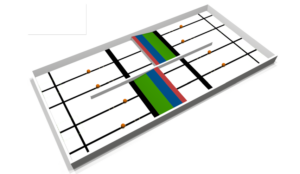
In the WRO RoboSports category teams design robots that compete with robots of another team. In a match two teams each have 2 robots on the field. The robots are coded to play the game autonomously and collaborate with each other where possible. The sport that is played by the robots changes every 2-3 years.
FUTURE ENGINEERS
In the WRO Future Engineers category teams need to focus on all parts of the engineering process. The teams get points for documenting their process and making a public GitHub repository. The specific challenge will change every 3-4 years. In the Self-Driving Cars challenge a robotic vehicle needs to drive autonomously on a parkours that randomly changes in each challenge round.
FUTURE INNOVATORS
In the WRO Future Innovators category teams develop a robot that helps solve real-world problems. There is a new theme every year, often connected to the UN Sustainable Development Goals. After research into the theme each team develops an innovative and functioning robotic solution. They present their project on the competition day.

